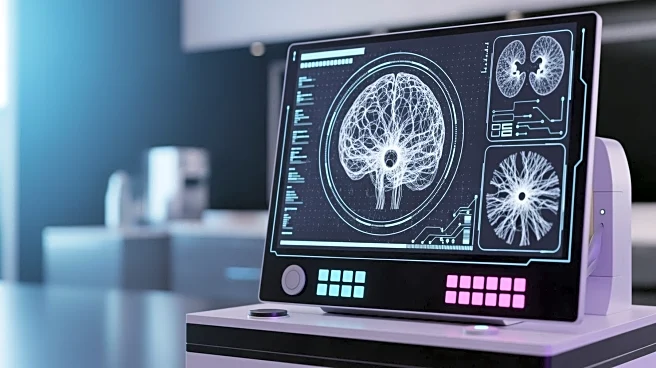What's Happening?
A research team has developed a tool called BMIgap, which uses brain imaging to predict weight changes and assess metabolic vulnerability. The study involved analyzing MRI scans from over 1,500 healthy
individuals and patients with psychiatric conditions such as schizophrenia. The BMIgap tool calculates the difference between an individual's actual BMI and the BMI predicted by their brain structure, providing insights into brain-based metabolic vulnerabilities. The tool was tested across various populations, including those with schizophrenia, revealing potential shared neuroanatomical substrates between BMI and psychiatric conditions.
Why It's Important?
The development of the BMIgap tool is significant as it offers a novel approach to understanding weight changes and metabolic vulnerabilities through brain imaging. This could have implications for personalized medicine, particularly in managing psychiatric conditions where weight gain is a common side effect of medication. By identifying individuals at risk of weight gain through brain imaging, healthcare providers can tailor interventions to prevent weight-related health issues. This research also highlights the potential for brain imaging to uncover shared neuroanatomical patterns between metabolic and psychiatric conditions, which could lead to more integrated treatment strategies.
What's Next?
The next steps involve further validation of the BMIgap tool across larger and more diverse populations to ensure its accuracy and generalizability. Researchers may also explore the integration of BMIgap into clinical settings to aid in the management of psychiatric conditions and associated metabolic risks. Additionally, there could be investigations into the impact of different medications on BMIgap values, which would help refine treatment plans for individuals with psychiatric disorders. The tool's application in predicting future weight changes could also be expanded to other health conditions where weight management is crucial.
Beyond the Headlines
Beyond its immediate applications, the BMIgap tool could contribute to a deeper understanding of the relationship between brain structure and metabolic processes. This research may prompt ethical discussions about the use of brain imaging in predicting health outcomes and the potential for such tools to influence healthcare decisions. The study also raises questions about the long-term implications of brain-based predictions in personal health management and the balance between technological advancements and patient privacy.








